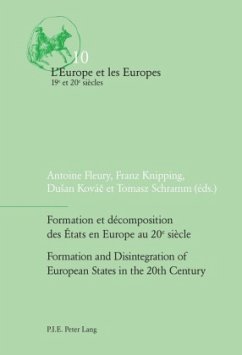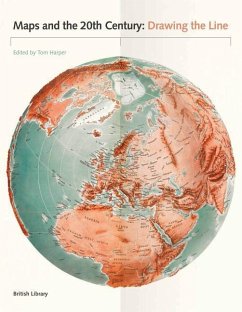
Européanisation au XXe siècle / Europeanisation in the 20th century
Un regard historique / The Historical Lens
Herausgegeben: Osmont, Matthieu; Robin-Hivert, Émilia; Seidel, Katja; Spoerer, Mark
Versandkostenfrei!
Versandfertig in 6-10 Tagen
45,25 €
inkl. MwSt.

PAYBACK Punkte
0 °P sammeln!
L'intérêt grandissant pour le concept d'européanisation ces dernières années fait écho à la transformation des sociétés européennes depuis la fin de la guerre froide. Dès lors, il apparaît de moins en moins légitime d'enfermer l'histoire contemporaine des pays européens dans un cadre exclusivement national. En effet, le concept d'européanisation permet à la fois de dépasser le cadre national et d'écrire une histoire de l'Europe à partir d'un angle plus large que celui de l'intégration européenne. Les contributions présentées dans ce volume démontrent à l'évidence que ...
L'intérêt grandissant pour le concept d'européanisation ces dernières années fait écho à la transformation des sociétés européennes depuis la fin de la guerre froide. Dès lors, il apparaît de moins en moins légitime d'enfermer l'histoire contemporaine des pays européens dans un cadre exclusivement national. En effet, le concept d'européanisation permet à la fois de dépasser le cadre national et d'écrire une histoire de l'Europe à partir d'un angle plus large que celui de l'intégration européenne. Les contributions présentées dans ce volume démontrent à l'évidence que le phénomène de l'européanisation ne se limite pas à l'après-1945, ni à la seule partie occidentale de l'Europe.
The growing interest in the concept of Europeanisation reflects the transformation of European societies since the end of the Cold War. Since then it has become less and less legitimate to consider the contemporary history of European states from a purely national angle. Indeed, the concept of Europeanisation allows national frontiers to be overcome and to write a shared European history from a broader perspective than just the European integration project. The contributions in this volume show that the phenomenon of Europeanisation is not limited to the post1945 period, nor is it limited to Western Europe.
The growing interest in the concept of Europeanisation reflects the transformation of European societies since the end of the Cold War. Since then it has become less and less legitimate to consider the contemporary history of European states from a purely national angle. Indeed, the concept of Europeanisation allows national frontiers to be overcome and to write a shared European history from a broader perspective than just the European integration project. The contributions in this volume show that the phenomenon of Europeanisation is not limited to the post1945 period, nor is it limited to Western Europe.












